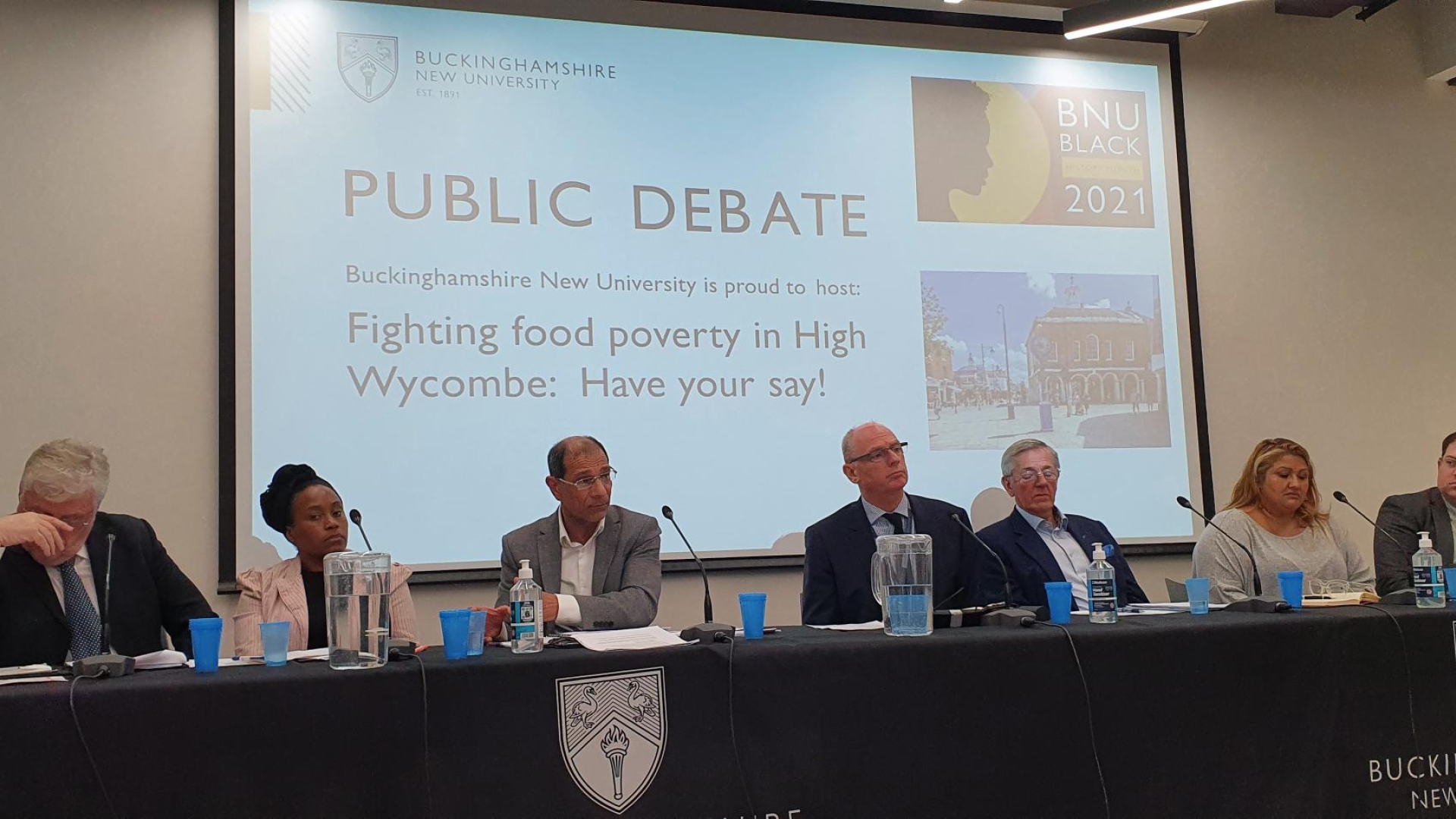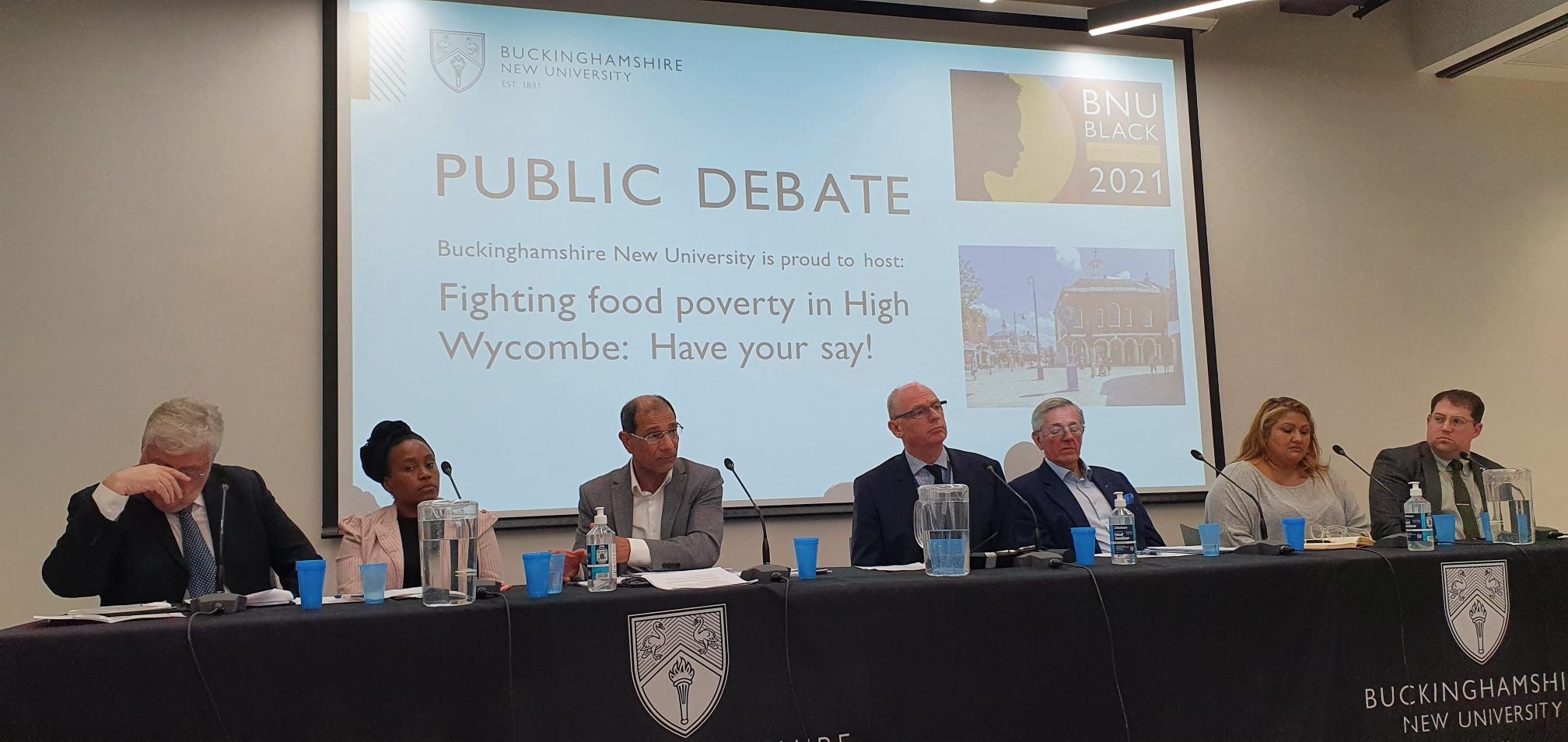
‘It could be any one of us’: University hosts public debate on Wycombe food poverty ‘crisis’
The Wycombe community came together last night to discuss the true scale of local food poverty and urged residents to ask for help if they need it.
At a public debate hosted by Buckinghamshire New University and its Vice-Chancellor, Professor Nick Braisby, panellists from Bucks Council, local foodbanks, charities and community interest groups discussed the causes, actions being taken and possible solutions to eradicating food poverty in Wycombe, described on the evening as a “big crisis.”
A recent report from the University of Sheffield highlighted how the most diverse area in Buckinghamshire has the UK’s highest levels of ‘food insecurity’. Asked about the true scale of the problem, the panel acknowledged that there is no official breakdown available for the Wycombe area, but weekly footfall at local foodbanks Wycombe Food Hub and One Can Trust suggests hundreds of individuals or families are using them. With food poverty thought to be affecting 7-14% of people in the UK, and Wycombe identified as a deprivation hotspot, panellist Henry Allmand, CEO at Heart of Bucks charity, estimated that around 8,000 people are living in food poverty locally.
“Most of us are two paycheques away from being in trouble,” said panellist Trevor Snaith, Chairperson at Wycombe Food Hub, while fellow panellist and Wycombe Women’s Aid trustee, Michelle Vickers, urged attendees: “Forget your preconceived notions of people in poverty […] it could happen to any one of us.”
Various themes emerged on the evening, including: challenging the stigma of asking for help and effective signposting; greater education of food and life skills; reaching residents from a diverse range of cultures; and greater collaboration between organisations, businesses and charities on achieving the mutual goal of eradicating food – and other forms of – poverty in Wycombe.
‘If you need help, ask for it’
The stigma of asking for food parcels and other related forms of help was the major theme of the evening. An audience member who experienced job loss and short-term food poverty shared his shame of using a food bank. Graham Peart, Chair of Trustees, One Can Trust and Councillor Arif Hussain, Chair of High Wycombe Community Board, shared their regularity of delivering food parcels at night, so recipients’ neighbours do not see. Graham added: “What we can’t put a number on is the people who don’t come forward at all.”
Charmaine Fyffe-Khepera, Founding Director of Khepera Community Interest Company, said the stigma can stem from cultural values. Sharing the sentiments with an audience member who asked about measures to reach out to Black, Asian and Minority Ethnic (BAME) communities struggling with food insecurity, Charmaine said solutions will not be “one size fits all” and flagged the health conditions that can arise for ethnic minorities from poor nutrition.
Education paramount
Charmaine discussed the necessity of food education and initiatives, such as community food kitchens like Khepera CIC, in tackling the issue from all angles: “There’s a distinct lack of education, in terms of what is actually healthy food and how to cook it.” Trevor and Graham, whose organisations rely on food donations, both noted that they often receive unusual vegetables that clients tell them they aren’t sure what to do with.
Heart of Bucks’ CEO Henry commented on the importance of health and education: “We need to think about knowledge of nutrition and the accessibility and low prices of junk food.” He added that the whole food system has a responsibility and that profits should not be put above health, prompting comments from the audience. Attendee Tony Bull, Trustee of Citizens Advice Bucks, agreed that food poverty is a symptom of the underlying problem of poverty and deprivation – 29,000 children across Buckinghamshire live in poverty, according to the charity.
The panel echoed the points, and Michelle explained how Wycombe Women’s Aid sees the impact on children. Graham commented on the vicious cycle of poor nutritional understanding, and how learned behaviour can lead the next generation into similar problems, noting: “Almost all of the families using our services have children. It is the children that I am truly worried about.”
Working together
Vice-Chancellor Professor Nick Braisby rounded up the debate by asking the panel how their organisations can work together to eradicate food poverty. The panellists largely agreed that a collective approach is necessary, with room for improvement.
Trevor Snaith said: “Most organisations and charities work in their own little bubbles and that needs to be broken down.” Councillor Hussain added: “We are a community. Things will get better. We need to reach out and say we are here to help. If anyone in the community has projects that need funding, come forwards.”
